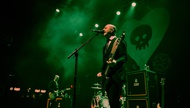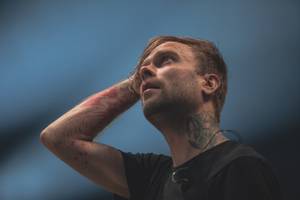When Mike Garson joined David Bowie’s band for its first U.S. shows—on the famed Ziggy Stardust Tour in 1972—he admits had no idea who Bowie was. Five decades later, Garson is credited as Bowie’s longest touring band member, and one of the select few who knew the Thin White Duke up close and personal.
Those flowing piano lines on “Lady Grinning Soul” and “Time” off Aladdin Sane and “We Are the Dead” from Diamond Dogs? That’s him. In total, Garson worked with Bowie on 10 studio albums and served in the lineup for the late icon’s final tour in 2003 and 2004. Today, he’s the one taking Bowie on the road, bringing the Starman’s songbook to life again through Celebrating David Bowie, a tour featuring Bowie associates like guitarist Earl Slick, vocalist Bernard Fowler and guitarist Gerry Leonard.
We caught up with Garson to talk about the healing power of Bowie’s music and the tour, which stops at Brooklyn Bowl on February 27.
Where am I reaching you today? I’m on a bus just coming into New York City for our concert tonight. We just finished our first two shows and we have 26 more.
So you were a classically trained musician with a new wife and kid when you landed a gig playing on the first U.S. tour with David Bowie—this eccentric guy who wore makeup and women’s clothing and called himself Ziggy Stardust. What were your first thoughts? Were you freaked out? Intrigued? I was freaked out. I was intrigued. And I said to my wife, “Where am I?” These guys were dressed in the wildest costumes, and I’m in jeans thinking, “I’m on another planet.”
And then you had to dress up as well.That was their way to get back at me for being so normal. They dressed me up, put makeup on me and everything. And furthermore, they thought it was hilarious that I didn’t know any of the music or David Bowie.
He was already starting to get big, right? Exactly. So on [the Celebrating David Bowie] tour I’m doing now with all these alumni musicians, course they grew up with David’s music. But I was a little older, so I grew up with jazz music and classical, so I was sort of a freak in my own way.
The Ziggy Stardust tour is the same tour where he famously broke up the band onstage, yet you continued to play with him. Why do you think that was? It’s true. I was [originally] hired for eight weeks. But I have a gigantic love for the piano, and I had studied so many styles as an upcoming musician, and I learned how to play solo and pop and fusion and jazz and classical. David was a chameleon and always changing styles, so he utilized anything that I could do that could serve his music.
How old were you at that time? I think I was 26, so about a year and a half older than him. It’s hard to believe. They were great guys, and Mick Ronson was totally an unsung hero. To play with them was very refreshing, because I was used to reading music, and this was a rock band. It was an education for me.
You recorded a live tribute to David that you’ve described as the way how you felt about him in musical terms. What it’s like creating something so heartfelt and emotional on the spot? As a composer and an improviser, someone who makes things up on the spot from all the hard years of working eight hours a day, I have the ability and a gift, a God-given gift I would say, to be able to sit down and compose spontaneously on the spot, especially if I feel something. I’ve written at least 10 homages to him. It just comes very natural, and in every show I do something that’s a little different as an homage to him.
You also wrote “Symphonic Suite for Healing,” which was created with a brain surgeon to help hospital patients. Did writing something like that prepare you for something like Bowie’s passing? That’s a good observation, and the answer is yes. I believe any music that’s coming from a good heart heals the public that likes that music, be it The Beatles or Justin Timberlake or John Lennon or Mozart or Chopin. I specifically worked with a brain surgeon and tested my music out on patients, and they particularly liked certain ones, so that became a symphonic healing suite. [For example,] a Parkinson’s patient asked me to write a tango for them.
It sounds like Celebrating David Bowie is a healing suite for Bowie fans, then. Perfect. That’s exactly right. People who like Bowie, that’s healing for them. What we’re doing for David, it’s so cathartic for myself and the band and the alumni. It’s very healing for the fans. I look out there, and they’re singing every word to every song loudly and either smiling or crying—nothing in between. And the quality of the music is as high because it’s the same people [who worked with Bowie].
How did you choose the songs for this? I wanted some of the hits, like “Life on Mars,” “Space Oddity” and “Changes,” but I also wanted some of the more obscure stuff. We’re doing “Conversation Piece,” “Quicksand,” “Can You Hear Me.” We’re opening the show with “Bring Me the Disco King” which is just piano and voice. Bernard Fowler is unbelievable, and Gaby Moreno and Joe Sumner. It takes a village to create David’s music, you know?
You were part of Bowie’s last tour, the Reality tour, and you stopped in Vegas then. Do you have any memories of that show? Did David like Las Vegas? To be perfectly honest, he hated it (laughs). I loved it. The audience, they were people who were gambling, and he was very upset. We did our job, but he did not like it. I love it. I come there with my family and I have fun there, but he likes his fans in the front row and the front row was given to high rollers. But I’m looking forward to playing there with this group.
When this tour is over, what’s next for you? Another tour, and then another one and another one. I have so much music in my head.
CELEBRATING DAVID BOWIE February 27, 8 p.m, $32. Brooklyn Bowl, 702-862-2695.








